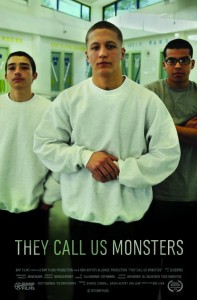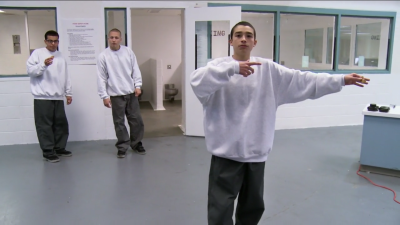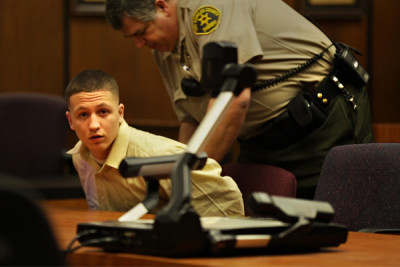THEY CALL US MONSTERS is a powerful documentary that comes to us from director Benjamin Lear as he takes us behind the walls of the Sylmar Juvenile Correctional Facility and the California judicial system to look at a growing epidemic in California prisons with minors convicted of violent crimes being tried as adults but housed in a juvenile facility and kept away from other juvenile offenders.

THEY CALL US MONSTERS focuses on four young men – Antonio, Juan, Darrell and Jarad – as they sign up for a special rehabilitative screenwriting program for juvenile offenders in jail led by screenwriter Gabe Cowan. The idea of the program is to mentor them and over the course of 20 weeks, the boys actually write a screenplay which Cowan will then turn into a film.
We see interrogation footage of each of the boys, especially Jarad who faces four counts of attempted murder and who becomes the primary subject focus within the documentary. The boys talk, boast and brag, but also have many moments of on-camera honesty as they slowly start to trust not only Gabe Cowan but Lear and his small crew. But as the documentary goes on, we see what happens to each of the boys.
The day after a screenwriting session, Darrell goes for sentencing. He never returns. Thanks to the writing program which has allowed him to explore his own emotions, Juan gets up the courage to call a girl he has liked for a long time and express his feelings. Unfortunately, we also see his court trial and sentencing and its outcome. Similarly for Antonio and Jarad.

The camera captures the enthusiasm of the boys throughout their 20 weeks and importantly, we see the creativity and intelligence each has and what each brings and is capable of bringing to the table of life and society. Interesting is the subject matter of their screenplay as Cowan encourages them to “write what they know.” We see the pain of their lives take shape as characters in the script, gaining insight into what went wrong for each of them. And through it all, they push for authenticity and honesty within the script they are writing and movie Cowan will be making with it.
Thanks to keen editing by Eli B. Despres, the documentary has an assured flow that belies the uncertain futures each of the boys face. Standout are sequences showing the boys during their one hour a week free time in which they “get to be kids”, playing Marco Polo in the pool or playing handball with some of the guards who watch over them. Poignant are interviews with some of the guards who feel the dichotomy of each young man’s situation every day – they are violent criminals, but they are also “just kids”, and vocalizing the questions each of us watching the film should be asking – Where did society go wrong to lose these boys not only to the criminal acts of which they are being charged, but to the juvenile legal system? Can they be saved? Can the system be changed?

Lear goes in-depth exploring the justice system, complete with interviews with some of the boys’ attorneys and families, plus footage thanks to a surprise move by Judge Camacho in the Pomona District of the Los Angeles Superior Court who allows Lear’s cameras in the courtroom. Taking us right up through legislative changes in California, THEY CALL US MONSTERS raises many thoughts for discussion long after the curtains fall and the prison doors slam shut on these juvenile offenders.
Directed by Ben Lear
Los Angeles Film Festival review – June 1, 2016











